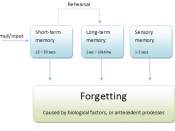Have you ever gone to see a really scary movie only to come out and forget where you parked you car? Did you stop to think about why you forgot? What was going on in your brain to make you forget? Well in the experiment you are about to learn, the psychologists attempted to do just that, only their subjects were rats. Previous experiments have shown that stress impairs memory, more specifically, spatial memory. This experiment builds on that. However, in order to understand what happened, you need to know a few key terms.
Spatial memory is the learning and retrieval (remembering) of previous experiences in a certain environment, kind of like studying for a test (Adelson). You learn the material and have to remember it come test time. Working memory (short-term memory) is dependent on the hippocampus to remember newly acquired info (psycheducation). The hippocampus is the part of the brain responsible for forming new memories.
For example, in the movie 50 First Dates (with Adam Sandler and Drew Barrymore) Barrymore suffered damage to her hippocampus. This eliminated her ability to remember events that had just happened (short term memory). Reference memory (long term memory), on the other hand, is not dependent on the hippocampus because information is being learned over a longer period of time and being stored in other parts of the brain.
In the Woodson, et al., 2003 study, the rats' memory was tested using a Radial Arm Water Maze (RAWM). The RAWM is a tank filled with water. There are six arms that meet in the middle. The illustration is an example of what one may look like. The rat is placed in one of the arms and has to find its way to the platform hidden just below the water's...


